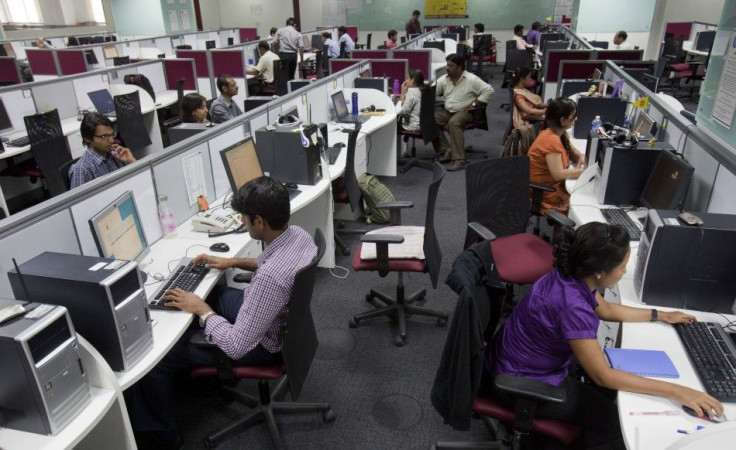How New Age Finance Is Changing India, From Saving Up For The Football World Cup To Building A Bangalore Startup

BANGALORE, India -- Shoeb Shaikh is busy planning his next globetrotting adventure to watch the FIFA World Cup live from Russia. Shaikh is saving with Scripbox, a startup that helps people invest in mutual funds, an entirely different approach to one he’s taken before. In previous years, like the majority of middle-class Indians, Shaikh put money aside in a savings account, but a couple of emergencies set him back substantially. His 2014 trip to watch the World Cup in Brazil almost wiped out his savings."This time around, I'm going to ensure that I won't make the trip and come back broke. I'm not putting all my eggs in one basket," Shaikh told International Business Times.
The soccer fanatic’s world cup ambitions started in eighth grade, as Manchester United, in 1999, became the first English club to win what European football fans know as a "treble," comprising the Premier League, the FA Cup and the UEFA Champions League. The last three minutes of that historic match, in which Manchester United scored two injury-time goals to beat Germany's Bayern Munich 2-1 and clinch the UEFA title, left young Shaikh, in faraway India, mesmerized. But, at a cost of around half a year’s salary, a World Cup trip was not an easy goal.
Shaikh’s investment using Scripbox is part of a larger, as yet nascent, change in urban India. Up until recently, even upper-class, wealthy Indians have not invested in mutual funds but have relied on banks that pay interest. Now, households that have traditionally strongly believed in bank savings deposits are beginning to spend on credit -- led by the young -- as well as invest in instruments beyond bank deposits. India's smartphone-led Internet revolution -- by one estimate, it is expected to have more Internet users than the U.S. by the end of this year -- has brought financial information to anyone who wants to Google it. Startups such as Bank Bazaar, one of the ventures in which Amazon.com Inc. has invested in India, make it easy to compare and buy personal loans or insurance policies.
Unlike in the U.S., where mutual funds are mostly long-term and focused on retirement planning, young Indians like Shaikh are also tapping them as short-term investments to save for vacations or weddings. India's capital markets regulator, Securities and Exchange Board of India, is introducing changes, such as allowing e-commerce companies to sell mutual funds in India, to get more people to invest in the stock market. This relaxation of Indian regulation could trigger "a lot of financial technology opportunities," Bhaskar Majumdar, a partner at venture capital firm Unicorn India Ventures, said in a recent interview on Bloomberg TV India. "Fin-tech in India hasn't even scratched the surface, except in the area of payments. India is ripe for some drastic changes in fin-tech," Majumdar said in the interview, whose firm has recently raised about $25 million to invest in startups in India.

These untapped opportunities are being seized by a new generation of young, educated, tech-savvy Indians who are pursuing a new kind of financial management, of which Shaikh is representative. After a degree in electronics engineering and an MBA in public relations from well-known schools in his hometown, the Western Indian city of Pune, Shaikh took a job in Bangalore at a multinational company that was building its presence in India. But, inspired by the burgeoning startup scene in Bangalore, he gave up his lucrative corporate job to join two friends who had started a PR agency, Ideosphere, as a partner at a much lower base pay. He discovered Scripbox after his colleagues made a pitch to represent the startup and Shaikh realised that he could use the company to boost his own savings.
For most Indians, such financial planning is out of reach but Sanjiv Singhal, Scripbox's founder, hopes that will change. In a nation of 1.25 billion, where most people don’t have bank accounts, industry estimates show that there are only around 2.5 million active trading accounts in India in the stock markets. People who invest in mutual funds are about twice as many, Singhal said, but some of them will be the same people buying shares. In comparison, the amount of money saved in fixed deposits each year in India is several times the total money invested in the stock markets. People typically just save a third of their income in India, rather than invest it.
"One year's fixed deposits is higher than cumulative investments in capital markets ... that's got to change, because fixed deposits don't beat inflation," Singhal told IBT. Without using Scripbox, Shaikh said, he wouldn’t have factored inflation into his savings.
Priya Sunder, who co-founded and runs financial planning firm Peak Alpha in Bangalore, agreed that inflation can make fixed deposits more risky than investing in mutual funds: "Simply investing in bank deposits, you aren't beating inflation, so by being risk averse you're actually going to put yourself in a lot more risk," Sunder said in a phone interview.
The developed markets hold lessons for Indian investors, because India too will eventually go down that route when it comes to interest rates, Sunder pointed out. Fixed deposits in India yield about 8 percent to 8.5 percent today, "but our parents were getting 13.5 percent to 14 percent." After adjusting for inflation, just below 4 percent in India, and tax deductions on the interest paid out by the bank on the deposits, simply putting money in the bank would leave people poorer down the line.
"If I were living in our parents' or grandparents' time, I wouldn't risk my money in the market, because the (bank) returns were fairly decent, " Sunder said. Today, however, "you can't not afford to take the risk" of investing in mutual funds and the stock market.

Capital Float
Individual consumers such as Shaikh aren't the only ones benefiting from new-age finance in India. Small businesses, and Bangalore's startups, are also taking advantage of alternatives to cumbersome paper-driven procedures and rigid terms at large banks.
Going to a large bank is a lengthy process that can stretch for over a month, and involves collateral, Sanjay Singh Gujjar, who runs Dangus RM, a fashion apparel vendor, told IBT.
One of his clients is Myntra, the fashion unit of Flipkart, India's largest e-commerce company, and it was through Myntra that he was introduced to Capital Float, a lender backed by venture capital firm SAIF Partners, which specializes in quick, flexible loans to small businesses.
"These guys were like instant for us, it happened in three days," Singh, a former Reebok India executive, said in a phone interview from Gurgaon, near New Delhi. "They look at your track record" to lend quick-turnaround working capital loans against invoices, ranging from 2 million rupees to 15 million rupees, he added.
Ajith Karimpana, whose furniture-rental business, Furlenco, is expanding quickly, described Capital Float as “a boon to startups." Two years ago, Karimpana was looking for a six-to-seven-month working-capital loan to keep the operations at his Bangalore-based startup chugging along. Today Furlenco's advertisements have become a familiar part of ad breaks on Bangalore's FM radio channels.
For a young company that was yet to break even, traditional bank loans wouldn't have worked. Only another startup would have empathized with Karimpana's needs and Capital Float helped out while managing to meet every requirement regulators set for such "non-banking finance companies" in India. The experience led him to approach Capital Float again last year, he said in the email.

Changing Finance
In its interactions with small businesses, Capital Float resembles an Internet startup. The pace of change is something that the nation's financial regulators are capitalizing on, in the hope it will encourage more people to have bank accounts, as well as create jobs in the financial services sector.
Earlier this year, the Reserve Bank of India, the country's central bank, handed out what are expected to be the first of many "payments bank" licenses. Such operators can take deposits and facilitate payments, but aren't allowed to lend money. Among the licensees is One97 Communications, backed by China's Alibaba Group Holding Ltd., which operates a mobile wallet called Paytm in India.
These changes, along with relaxed banking laws that allow e-commerce businesses to sell mutual funds, make the atmosphere conducive for companies such as Scripbox to get people to "overcome their fear of investing," Singhal said.
"It takes four to six minutes to get started" on Scripbox, Singhal said. There is a longer, offline process that involves providing the documentation required to support a "know-your-customer" regulatory requirement but, that done, one can start with investing as little as 10,000 rupees (about $150).
That means, for now, it's only the urban, educated middle-classes that can take advantage of these changes. Singhal agrees that this is mostly helping the "top of the pyramid” but said that ScripBox is working on bringing down its own investment threshold to 5,000 rupees ($75) a month.
Currently the minimum investment for mutual funds is set at 5,000 rupees, under Indian rules, but Singhal expects it could go down to 1,000 rupees and wants Scripbox to be ready to tap the 300 million to 400 million potential customer base that would release.
But change is coming: Almost two-thirds of Scripbox users are first-time investors in mutual funds, Singhal said. Change is also evident in investment goals. "It isn't just saving for retirement anymore. It's about taking a break and traveling for a year, or going to the football world cup," he said.
Shaikh started on Scripbox in August last year. So far, he reckons he has saved about 15 percent of what he will need for the 2018 trip. He has time on his side -- and mutual funds.
© Copyright IBTimes 2025. All rights reserved.






















